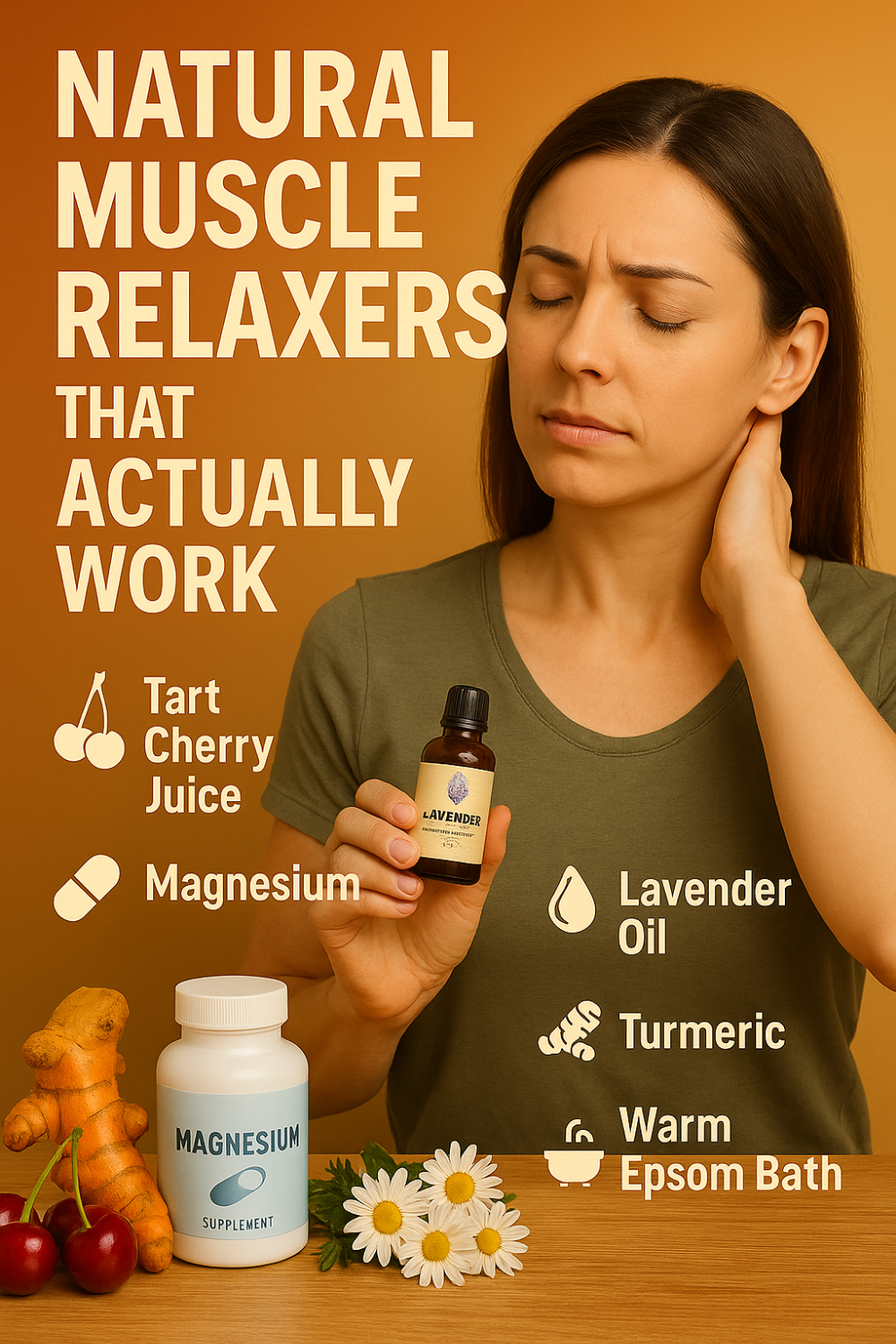Natural muscle relaxers offer a safe, research-backed route to calm spasms, loosen tight fibers and speed recovery after long hours at a screen, a punishing workout or an awkward night’s sleep. By swapping synthetic pills for nutrient-rich foods, soothing herbs and targeted essential oils, you can curb inflammation, ease pain and keep moving freely throughout the day.

- Causes Of Muscle Spasms
- 9 Effective Home Remedies For Muscle Pain Relief
- Homemade Muscle Relaxant Oil Recipe
- Additional Tips To Reduce Muscle Spasms
- Frequently Asked Questions
Causes Of Muscle Spasms
Muscle spasms most often hit the neck, shoulders and back because of poor posture, but hands, calves, hamstrings and the abdomen are also vulnerable. Common triggers include:
- Prolonged strenuous exercise or heavy physical work
- Incorrect sitting, walking or sleeping positions
- Uterine contractions during menstruation
- Sudden twists, bumps or falls
- Rapid weight gain or a sedentary lifestyle
- Nutrient gaps in vitamin D, magnesium or protein
- Chronic conditions such as arthritis, fibromyalgia, muscular dystrophy, multiple sclerosis or McArdle’s disease
Exploring natural muscle relaxers can ease soreness without the long-term side-effects linked to painkillers.
9 Effective Home Remedies For Muscle Pain Relief
1. Chamomile
Steep three teaspoons of dried chamomile in hot water for one minute to make an anti-inflammatory tea, or massage diluted chamomile essential oil into tight areas to boost blood flow and ease menstrual or post-workout cramps.
2. Cherry Juice & Extracts
An 8-ounce glass of tart cherry juice before and after training delivers antioxidants that reduce exercise-induced muscle damage and speed recovery for runners and lifters.
3. Blueberries
Blend a cup of blueberries into a pre- or post-workout smoothie; polyphenols cut inflammatory markers and may improve functional mobility in older adults.
4. Cayenne Pepper
Capsaicin blocks pain signals. Sprinkle cayenne into soups or apply a low-dose capsaicin cream to cramped calves or stiff shoulders for warm, lasting relief—especially useful for fibromyalgia pain.
5. Pomegranate Juice
Drink 10 ounces after heavy lifting or downhill runs. Polyphenols and nitrates help restore strength and lessen tenderness in overworked muscles.
6. Peppermint
Sip fresh-mint tea or massage diluted peppermint oil onto problem zones; menthol cools the skin, improves circulation and relaxes contracting fibers (avoid concentrated oil with liver, bile-duct or gallbladder issues).
7. Rosemary
Add rosemary leaves to a warm bath or rub rosemary-infused carrier oil into sore joints. Rosmarinic acid eases spasms and even helps relieve menstrual cramps.
8. Lavender
Four drops of diluted lavender oil massaged into sore muscles, followed by a warm shower, enhance blood flow and calm soreness in the back, knees and abdomen.
9. Essential-Oil Aromatherapy
Frankincense, lemongrass and cypress oils—diluted in almond or coconut oil—provide antispasmodic benefits during steam inhalation or a full-body massage.
Homemade Muscle Relaxant Oil Recipe
Ingredients
- ½ cup coconut, olive or jojoba oil
- 10 drops lavender essential oil
- 10 drops peppermint essential oil
- 5 drops eucalyptus essential oil
Method
Pour the carrier oil into a dark glass bottle, add the essential oils and shake gently. Massage one teaspoon onto sore spots for cooling relief and deeper muscle release. Store away from heat and light.
Additional Tips To Reduce Muscle Spasms
- Rest & Hydration – Quality sleep and plenty of fluids help fibers repair.
- Massage Therapy – Deep-tissue work unties knots and improves flexibility.
- Warm & Cold Compresses – Heat boosts circulation; ice tames swelling.
- Magnesium-Rich Epsom-Salt Baths – A 20-minute soak replenishes magnesium and relaxes tight muscles.
- Nutrient Focus – Increase vitamin D (sunlight, fatty fish), protein (whey, eggs, legumes) and magnesium (almonds, spinach, black beans) to support ongoing muscle health.
- Limit OTC Pain Gels – Use lidocaine, camphor or menthol creams sparingly if natural methods are not enough, and consult a professional for persistent pain.
Frequently Asked Questions
How can lifestyle changes support muscle relaxation?
Daily stretching, ergonomic posture, balanced meals, stress management and 7–8 hours of sleep work alongside natural muscle relaxers to reduce tension and speed healing.
Is CBD oil an effective muscle relaxant?
Preliminary studies are promising, but dosage and legality vary. Seek medical guidance before use.
Does alcohol relax muscles?
Alcohol may briefly dull nerve activity, yet it dehydrates tissues and delays healing, so it is not recommended for muscle relief.
Can edible cannabis ease cramps?
Some users report relief, though effects are unpredictable and psychoactive. Follow local laws and professional advice.
What is considered the strongest natural muscle relaxer?
Effectiveness differs by person, but chamomile tea, tart cherry juice and pomegranate juice are highly regarded for evidence-based relief without notable side-effects.